| Article ID | Journal | Published Year | Pages | File Type |
|---|---|---|---|---|
| 6835677 | Computers in Human Behavior | 2018 | 34 Pages |
Abstract
Adolescents who engage in habitual digital gaming activities may be at risk of gaming disorder. Regular periods of gaming abstinence may reduce gaming urges and control gaming at healthy levels. This study examined the impact of 84-hour gaming abstinence on withdrawal, affect, and psychological distress in adolescent habitual gamers. A two (Group: abstainers; control) x six (Time: baseline; day 1, day 2, day 3; post-test; 7-day follow-up) repeated measures design was employed. A sample of 37 adolescent participants were recruited by referral from parents with concerns about their gaming behavior. Participants completed questionnaires and answered open-ended reflective questions about gaming. Overall, the principal hypotheses received limited support. Both groups reported a significant reduction in withdrawal symptoms post-baseline, which was maintained at follow up. Abstainers felt bored without a daily gaming routine, but reportedly developed new gaming attitudes and engaged in family activities and outdoor physical activities. Daily self-monitoring may have reduced gaming withdrawal, and self-monitoring combined with brief abstinence may have fostered healthier gaming attitudes. However, the reduction in withdrawal among non-abstainers suggests that the relationship between urges to play games and actual time spent playing may not be straightforward.
Related Topics
Physical Sciences and Engineering
Computer Science
Computer Science Applications
Authors
Carlee Evans, Daniel L. King, Paul H. Delfabbro,
